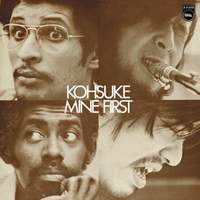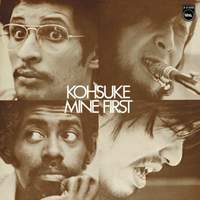Recording of the Week,
Kohsuke Mine - First

Thanks to the internet age, Japanese jazz - primarily older recordings, mind - has had something of a resurgence in popularity of late. Perhaps it’s the mystique of a culture so far removed from Europe and America, combined with the familiar sounds of jazz music, that compels so many Western listeners to delve into the history of Japan’s jazz scene. Records like Hokkaido pianist Ryo Fukui’s Scenery found a new popularity thanks to online platforms like YouTube shortly after his passing, with him and many other Japanese jazzmen seeing reissues of their albums on labels specialising in crate-digging, and in the process uncovering some hidden gems. First, the debut studio recording by saxophonist Kohsuke Mine (pronounced ‘mee-neh’), is one of those hidden J-jazz gems; first released in 1970, it has remained in relative obscurity until its reissue this year, the ninth release in Barely Breaking Even’s ‘J Masterclass’ Series curated by the label’s own Mike Peden and Tony Higgins.
First came at a key turning point in the narrative of J-jazz’s evolution. American music - jazz included - had already enjoyed a following in Japan for the best part of the 20th century. Even during the Second World War when it was banned on the grounds of being “enemy music”, its widespread popularity meant it never truly went away, the sounds of jazz permeating the popular music of the country throughout the war. Post-war Japan, now occupied by America, saw a new wave of jazz artists springing up, and by the late 1960s the scene was abundant with experimentation, with free jazz artists dominating the circuit like saxophonist Kaoru Abe and guitarist Ryo Kawasaki, the former of whom’s storied life is documented in the 1995 biopic Endless Waltz, and the latter having been instrumental in the development of the guitar synthesiser and an early pioneer of jazz fusion. Mine’s childhood was also marked by this changing image of Japan, having spent most of it evacuated from Tokyo to live in the small coastal town of Miyako in the northern prefecture of Iwate. Playing the clarinet from an early age and taking an interest in mambo music, his transition to the jazz saxophone came in his teenage years, and he spent much of the 1960s playing in the Tokyo jazz scene and even in the occupying US air bases.
Mine is joined by Masabumi Kikuchi on keyboards, and an American rhythm section of bassist Larry Ridley and drummer Lenny McBrowne, both of whom were in town to record a live set with American guitarist Kenny Burrell (released as Guitar Genius in Japan with Jim Hall and Attila Zoller in 1970). The sessions for First were the first and only time this quartet played together, yet you’d be forgiven for thinking they were Mine’s regular band, with snappy improvisation and an unbreakable groove throughout the recording. Kikuchi’s presence on this album is an important factor; it was Kikuchi who persuaded Nippon Columbia - the Japanese offshoot of Columbia Records - to record an album with Mine as leader, following his first recording as part of the live album Jazz in Tokyo ‘69, while the keyboardist himself was a highly prolific recording artist in the scene by the time of these sessions.

Each member of the quartet contributes their own work to the session, with Kikuchi giving us both ‘Love Talken’ and ‘Little Abbi’, while Mine’s stirring and dynamic ‘Morning Tide’ opens up the record with his saxophone lines crossing Kikuchi’s keys in the opening melody. Mine’s tone shows definite influences from the American free and post-bop scenes, with an unmistakable Coltranian lilt to his phrases on tunes like Ridley’s ‘McPhee’. The proceedings are only bolstered further by the inclusion of the Thelonious Monk classic ‘Straight, No Chaser’ in the middle of the record with Mine taking on the iconic bluesy riff, while the McBrowne tune ‘Bar ‘L’ Len’ brings the album to a raucous close. As much as it’s Mine’s name on the cover - and make no mistake, he certainly steals the show - it’s the chemistry of the whole quartet that makes for some of the more standout moments on First; frequent are the moments where the band trade off and slip under each other’s playing. Surprising, again, that these four had never played together before.
While many Japanese-born jazz musicians would tend to move overseas to the United States or Europe to further their careers internationally, Mine remains in Japan to this day - though he did spend two years between 1973-75 living in New York. First is about as strong as a debut can get; later Mine work would encompass sounds from post-bop and fusion, as well as spiritual jazz, and for the most part all the ingredients are here on First. It’s experimental for sure, but not so left-field that it becomes unlistenable for the more casual jazz fan. At 77 years of age, Mine is still active to this day - so be sure to send some support his way if you’re a fan of his first studio outing.




